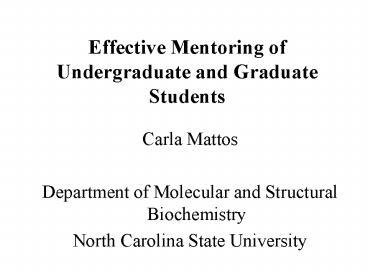Effective Mentoring of Undergraduate and Graduate Students - PowerPoint PPT Presentation
1 / 16
Title:
Effective Mentoring of Undergraduate and Graduate Students
Description:
Title: PowerPoint Presentation Author: Carla Mattos Last modified by: QEM Created Date: 1/7/2002 6:13:24 PM Document presentation format: On-screen Show – PowerPoint PPT presentation
Number of Views:186
Avg rating:3.0/5.0
Title: Effective Mentoring of Undergraduate and Graduate Students
1
Effective Mentoring of Undergraduate and Graduate
Students
- Carla Mattos
- Department of Molecular and Structural
Biochemistry - North Carolina State University
2
Outline
- Mentoring in the science intellectual freedom
with guidance - Mentoring in networking and people skills
- 1) Create a supportive and collaborative lab
environment trust - 2) Managing life at the interface with science
- happy and fulfilled students will be the most
productive in their research and learning.
3
Get the students involved
- Take research project into the classroom
- Take the classroom into the laboratory
- Pair up postdocs and graduate students with the
undergraduates. - Encourage students to begin research their
freshman year. - Take students to regional and national meetings
to present their work.
4
Create a team environment
- Treat the students as important and serious
contributors to the research program - Make sure the students feel ownership of the
project they are involved in it for themselves,
not for the PI - Keep the task at a level where the students can
succeed given a genuine effort - Provide individual support either directly by the
PI or by involving graduate students and
post-docs
5
Minimize barriers between different stages in the
academic ladder
- Make sure that the people involved in mentoring
are motivated and excited by the research
project. - Share the big picture with the students.
- Have project group meetings including all members
of the team PI, post-docs, graduates students
and undergraduates
6
CAREER Probing protein surfaces using multiple
solvent crystal structuresCarla MattosNorth
Carolina State University
7
The Multiple Solvent Crystal Structures Method
MSCS
- Uses organic solvents to
- Locate and characterize protein binding sites.
- Probe plasticity in protein structure.
- Study hydration patterns
8
MSCS
- Solve crystal structure of protein in aqueous
solution. - Crosslink native crystals with gluteraldehyde
solve the structure of the crosslinked protein. - Soak crosslinked crystals in organic solvents
solve structure of protein in different solvents. - Superimpose the crystal structures and analyze
the results.
Mattos Ringe, Nature Biotechnology 14, pp
595-599 (1996)
9
Multiple Solvent Crystal Structures of Elastase
Mattos et al., Journal of Molecular Biology (2005)
10
The five model proteins
11
Year of funding Spring Summer Fall
0 (2002) Proteins and Molecular Mechanisms develop new course Data collection for MSCS of Ras Data collection for MSCS of Ras
1 (2003) Macromolecular Modeling refinement of the MSCS of Ras Write paper on MSCS of Ras. Data collection for MSCS of Lysozyme Submit Ras paper for publication. Data collection for MSCS of Lysozyme
2 (2004) Proteins and Molecular Mechanisms refinement of the MSCS of Lysozyme Write paper on MSCS of Lysozyme. Data collection for MSCS of calmodulin Submit Lysozyme paper for publication. Data collection for MSCS of calmodulin
3 (2005) Macromolecular Modeling refinement of the MSCS of calmodulin Write paper on MSCS of calmodulin. Data collection for MSCS of RNAse A Submit calmodulin paper for publication. Data collection for MSCS of RNAse A
4 (2006) Proteins and Molecular Mechanisms refinement of the MSCS of RNAse A Write paper on the MSCS of RNAse A. Data collection for MSCS of chymotrypsin. Submit RNase A paper for publication. Data collection for MSCS of chymotrypsin.
5 (2007) Macromolecular Modeling refinement of the MSCS of chymotrypsin Write paper on the MSCS of chymotrypsin and a review of binding surfaces of proteins studied by MSCS and other methods. Submit papers and finish the proposed project. Prepare one or more data sets from one of the lab projects to continue research in the classroom.
12
Organic solvents
Two additional conditions aqueous mother liquor
and cross-linked, making a total of 10 crystal
structures for each protein.
13
MSCS of Ras data sets collected at SER-CAT
Organic Solvent / Resolution Neat hexane
1.3 Å Neat cyclopentanol 1.4
Å 50 isopropanol 1.7 Å 50
dimethylformamide 1.7 Å 50 2,2,2
trifluroethanol 1.9 Å 60 1,6 hexanediol
1.7 Å 70 Glycerol 1.6
Å 90 R,S,R bisfuran alcohol 1.5Å 20 S,R,S
bisfuran alcohol 1.6Å Crosslinked in aqueous sol
1.7 Å
Ras in neat hexane
14
People Skills unspoken undercurrents
- Preach by example you are a role model for
your students - Genuine enthusiasm is contagious
- Understand cultural background and differences
between lab members encourage communication - Be sensitive and knowledgeable about issues of
gender, class, race set high expectation for
everyone but reach out to each student in the
particular way that is needed in order for the
individual to succeed. - Recognition is one of the most powerful
stimulators of ambition and drive for success
give positive feedback as often as opportunity
warrants, including along with constructive
criticism acknowledge your students publicly for
their contribution.
15
References 1) The End of Education Redefining
the value of school Neil Postman (1995) 2)
Teaching to Transgress Education as the Practice
of Freedom bell hooks (1994) 3) This fine
place so far from home voices of academics from
the working class CL Barney Dews and Carolyn
Leste Law (Edts) (1995) 4) Necessary Dreams
Ambition in Womens Changing Lives Anna Fells
(2004)
16
Mattos group meeting 2004































